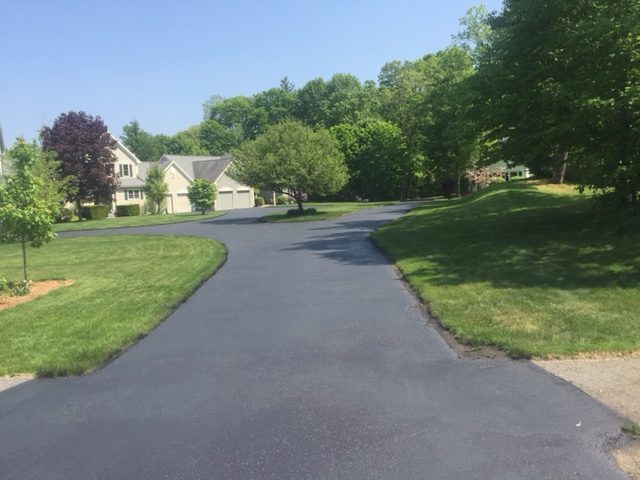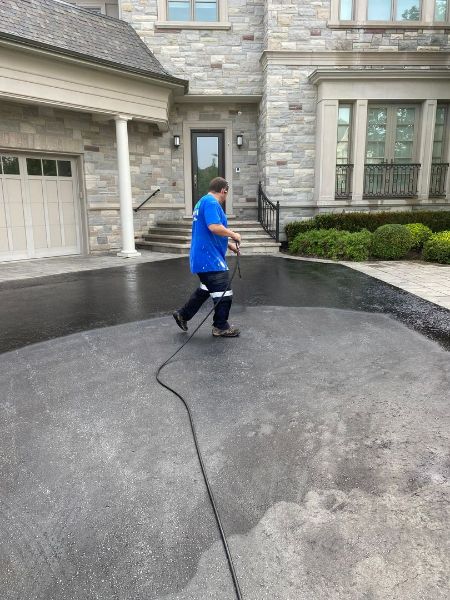Let loose the Prospective: Regrading and Asphalt Sealing for Commercial Rooms
Let loose the Prospective: Regrading and Asphalt Sealing for Commercial Rooms
Blog Article
Hot Mix Asphalt: A Sustainable Solution for Pavement
Hot Mix Asphalt (HMA) has actually arised as a leading lasting option for pavement remedies, supplying a myriad of ecological advantages and innovative technologies. As the demand for environment-friendly building methods expands, exploring the subtleties of HMA's sustainability can offer valuable understandings into the future of pavement services.
Ecological Advantages of Hot Mix Asphalt

Additionally, Hot Mix Asphalt helps to reduce metropolitan heat island effects. Its dark color soaks up sunlight, lowering the amount of warm showed back right into the ambience compared to lighter-colored sidewalks. This can reduce ambient temperatures in city areas, decreasing the demand for air conditioning and inevitably minimizing power consumption.
In enhancement, Warm Mix Asphalt adds to improved stormwater administration. Its porous nature allows water to recharge and infiltrate the sidewalk groundwater products, decreasing drainage and the risk of flooding. These environmental benefits make Warm Mix Asphalt a lasting choice for leading highways and roads.
Power Effectiveness in HMA Manufacturing
Is power performance a crucial element in the production of Hot Mix Asphalt (HMA)? Absolutely. Energy plays a significant role in the manufacturing of HMA, impacting both expense and ecological sustainability. One key element of power efficiency in HMA manufacturing is the use of warm mix asphalt (WMA) modern technologies (regrading). WMA enables the blending and positioning of asphalt at reduced temperatures contrasted to standard warm mix asphalt, resulting in lowered power usage throughout manufacturing. This procedure not just decreases fuel use however additionally decreases greenhouse gas exhausts, making it a much more eco-friendly option.
In addition, advancements in plant modern technologies have actually led to more energy-efficient HMA production procedures. Modern plants are made with attributes like recycled asphalt pavement (RAP) handling capacities, efficient heater systems, and boosted insulation, all adding to power financial savings. By enhancing power usage in HMA production, the market can reduce its carbon footprint while preserving high-grade sidewalk products. Energy effectiveness is, therefore, a crucial factor to consider in ensuring the sustainability of Warm Mix Asphalt production.
Recyclability of Hot Mix Asphalt
The recyclability of Warm Mix Asphalt (HMA) is a crucial facet of its sustainability and lasting environmental influence. HMA is one of one of the most recycled materials in the United States, with over 100 million lots of reclaimed asphalt pavement (RAP) being recycled every year in new sidewalk building and construction. Recycling HMA provides numerous environmental advantages, such as decreasing the requirement for virgin products, decreasing power usage throughout manufacturing, and lowering the amount of waste sent to garbage dumps.
The procedure of recycling HMA involves grating the existing pavement, squashing it right into smaller sized items, and blending it with new accumulation and asphalt binder to produce a recycled mix. On the whole, the recyclability of HMA plays a substantial role in promoting lasting methods within the sidewalk industry.

Long-Term Performance of HMA
Asphalt pavements show durability and resilience over an extensive duration, showing the long-term efficiency of Warm Mix Asphalt (HMA) The long life of HMA can be credited to its capability to withstand rush hour tons, severe weather problems, and the effects of aging. Research studies have actually shown that well-designed and effectively Learn More Here constructed HMA sidewalks can last for twenty years or even more with routine upkeep. The key to optimizing the long-term efficiency of HMA depends on making use of top notch materials, adhering to best techniques in construction, and executing effective upkeep techniques. Appropriate drainage, regular inspections, and timely repair services are essential for preserving the structural stability of HMA pavements with time. In addition, improvements in HMA modern technology, such as using polymer-modified binders and cozy mix asphalt, have actually better improved the sturdiness and longevity of HMA sidewalks. By prioritizing top quality construction and maintenance methods, HMA proceeds to confirm itself as a lasting and cost-effective option for lasting sidewalk facilities.

HMA: Longevity and Sustainability
Demonstrating both toughness and sustainability, Hot Mix Asphalt (HMA) has actually become a foundation in the construction of durable sidewalk facilities - hot mix asphalt. HMA's longevity stems from its ability to stand up to heavy tons, severe weather, and high web traffic volumes, making it a dependable option for highways, highways, visit their website and airport terminal runways. The structure of HMA, which commonly includes accumulations, binder, and filler, plays a vital function in enhancing its longevity and resistance to tear and use
Moreover, HMA's sustainability depends on its recyclability and energy-efficient production process. The capacity to recycle redeemed asphalt sidewalk (RAP) in new HMA mixtures minimizes the need for virgin materials and reduces the ecological influence of pavement building and construction and maintenance. Additionally, the energy performance of creating HMA exists in its reduced blending temperatures contrasted to other pavement materials, resulting in reduced power consumption and greenhouse gas discharges.
Conclusion
In conclusion, hot mix asphalt (HMA) supplies a sustainable solution for pavement with its environmentally pleasant qualities. HMA's recyclability, power effectiveness in manufacturing, and long-lasting resilience make it a green option for roadway building.
HMA is one of the most recycled products in the United States, with over 100 million lots of redeemed asphalt sidewalk (RAP) being reused annually in brand-new sidewalk construction.The process of recycling HMA involves milling the existing sidewalk, crushing it right into smaller sized items, and blending it with new aggregate and asphalt binder to create a recycled mix.Asphalt sidewalks demonstrate toughness and resilience over a prolonged duration, mirroring the long-lasting efficiency of Warm Mix Asphalt (HMA) Furthermore, advancements in HMA technology, such as the use of polymer-modified binders and warm mix asphalt, have actually better improved the durability and long life of HMA pavements. The capability to recycle redeemed asphalt sidewalk (RAP) in brand-new HMA mixes minimizes the demand for virgin find out this here products and minimizes the environmental impact of pavement construction and maintenance.
Report this page